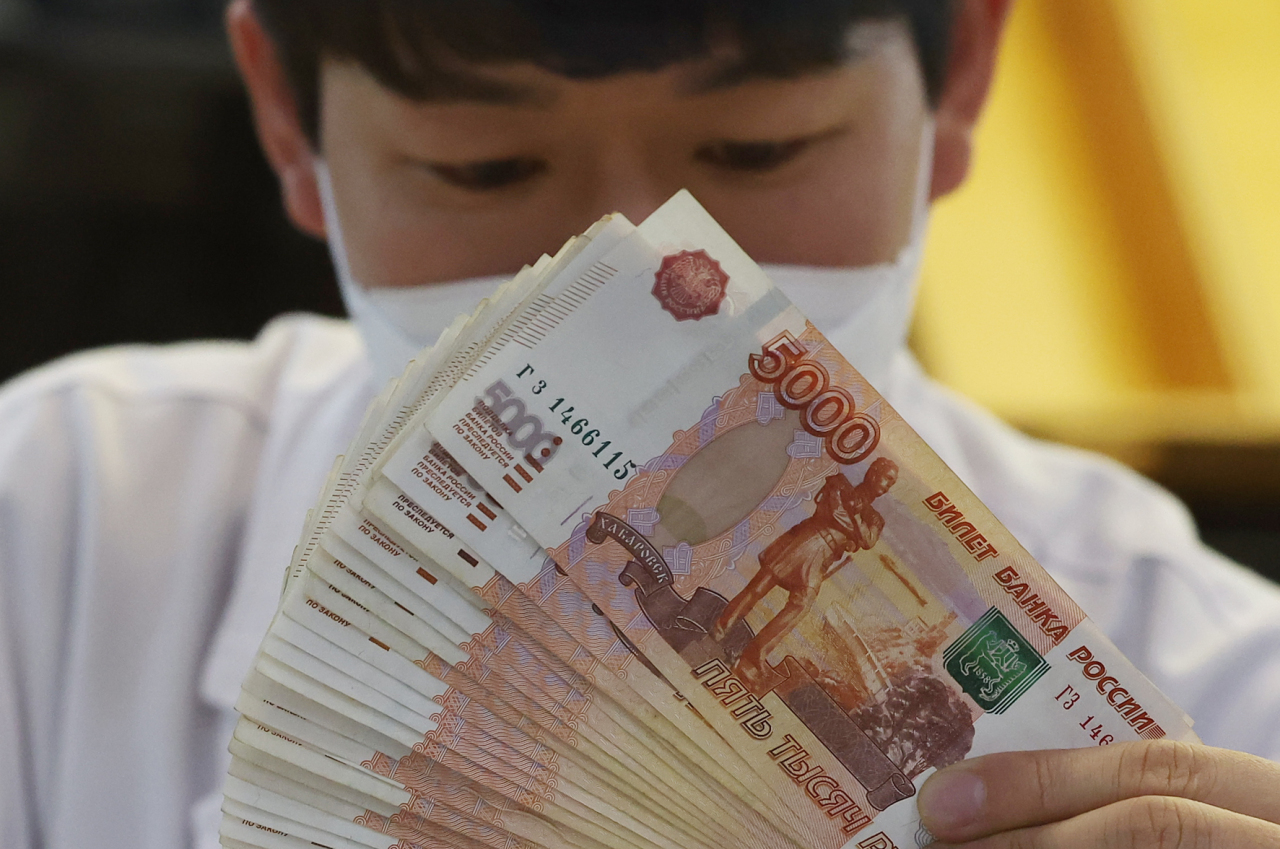Russia on Tuesday threatened to pile pressure on Korean businesses by introducing new bond rules to allow Russian companies to pay their foreign creditors in the Russian ruble, even for securities denominated in other currencies.
Companies here that prefer to get paid in the US dollar immediately started reviewing the impact, raising concerns that the new measure could eventually lead to a default.
Russia may not be a major market for many Korean firms, but big names like Samsung Electronics and Hyundai Motor have long poured considerable resources into securing a firm footing there.
Samsung, the largest smartphone and TV maker in Russia, recently suspended shipments of new products to Russia amid growing calls to act against Moscow’s invasion of Ukraine. Last year, its Galaxy phones made up almost 30 percent of the Russian smartphone market, according to market tracker Counterpoint Research, compared to 15 percent for its archrival Apple.
LG is also the top producer of home appliances there.
Both Samsung and LG operate production plants near Moscow. Currently, the plants are running normally as components remain in stock. But uncertainties are growing over the supply of key components.
Kia and Hyundai are the No. 2 and No. 3 carmakers in Russia, selling 205,801 and 171,811 vehicles, respectively, last year.
The duo produced almost 200,000 vehicles per year at its production base in St. Petersburg. But the carmakers have idled production at the facilities since last week, citing chip shortages. They had planned to resume production Wednesday, but the production halt could be extended considering the intensified tensions between Russia and Ukraine.
“Given Russia is not a major market for us, we expect no immediate impact,” an industry official said on condition of anonymity. “But we could suffer disruptions in the long run if the current unrest drags on.”
The new bond rules were announced after the Russian government earlier in the day designated South Korea as an “unfriendly state” that engages in hostile activities against Russia, its nationals or entities.
Seoul has joined the multinational move to implement sanctions against Russia, including export controls and the removal of Moscow from the SWIFT financial network. On Monday, Korea unveiled additional sanctions with plans to suspend transactions with Russia’s central bank, sovereign wealth funds and another Russian lender.
The bond restrictions come as the value of the ruble has fallen to a record low over the past month. The won-ruble exchange rate tumbled to 8.85 won per ruble on Monday, almost half from 16 won in mid-February. The ruble’s value against the dollar plunged over 40 percent during the same period.
On Tuesday, Korea’s Trade Ministry held an urgent meeting with government and industry representatives to discuss countermeasures across industries. During the meeting, business lobby groups called for government support to offset losses stemming from unfavorable exchange rates.
Hit hard by growing uncertainties surrounding supply constraints and rising costs, Samsung Electronics saw its stock price fall below 70,000 won on Tuesday, a first in four months. The share closed at 69,500 won, down 0.86 percent from the previous closing price.
“Despite robust demand for IT products and rising chip prices, geopolitical risks are driving down Samsung’s share price overall,” said Lee Seung-woo, an analyst at Eugene Investment and Securities.
Hyundai Motor closed flat at 168,000 won, while LG Electronics and Kia suffered losses to close at 118,000 won and 69,600 won, respectively.
By Lee Ji-yoon (
jylee@heraldcorp.com)





![[Herald Interview] 'Trump will use tariffs as first line of defense for American manufacturing'](http://res.heraldm.com/phpwas/restmb_idxmake.php?idx=644&simg=/content/image/2024/11/26/20241126050017_0.jpg)

![[Exclusive] Hyundai Mobis eyes closer ties with BYD](http://res.heraldm.com/phpwas/restmb_idxmake.php?idx=644&simg=/content/image/2024/11/25/20241125050044_0.jpg)
![[Herald Review] 'Gangnam B-Side' combines social realism with masterful suspense, performance](http://res.heraldm.com/phpwas/restmb_idxmake.php?idx=644&simg=/content/image/2024/11/25/20241125050072_0.jpg)